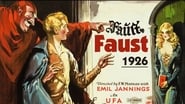GamerTab
That was an excellent one.
Exoticalot
People are voting emotionally.
LouHomey
From my favorite movies..
Catangro
After playing with our expectations, this turns out to be a very different sort of film.
Lee Eisenberg
"Nosferatu" was going to be a hard act for F.W. Murnau to follow, but he came pretty close with "Faust - Eine deutsche Volkssage" (simply called "Faust" in English). The movie combines traditional stories of Faust with Goethe's version of the story about a man who sells his soul to the Devil. Like "Nosferatu", the movie has a very surreal look: it's as though almost the entire story takes place in the foggy moors, which of course adds to the mystique.I should admit that a lot of the movie caused me to make the sorts of comments like on "Mystery Science Theater 3000", due to how full of itself the movie is. In addition, there was a scene that made my jaw drop: the people carrying the bodies of plague victims were dressed like the Ku Klux Klan! Yes, the movie has its strengths and weaknesses, but it is definitely one that I recommend. One of the really great films from inter-war Germany, along with "The Cabinet of Dr. Caligari", "Nosferatu", "The Nibelungenlied" and "M" (and there are probably plenty that I haven't seen).Starring Gösta Ekman, Emil Jannings, Camilla Horn, Frida Richard, William Dieterle, Yvette Guilbert, Eric Barclay, Hanna Ralph and Werner Fuetterer,
TheLittleSongbird
For me, along with Metropolis, The Gold Rush and The Passion of Joan of Arc, this is one of the finest movies of the 1920s. In design and direction especially, Faust is a masterpiece. It has a great story with a strong operatic feel, and the characters are great, Mephistopheles is especially memorable.F.W.Murnau's direction is superb. This is especially true in the duel between Faust and Mephistopheles which defines the term epic in every sense, and part of the reasons why it works so well is the wonderfully malevolent atmosphere that Murnau, Robert Herlth and Walter Rohrig create. The music fits amazingly well and the story despite one or two scenes in the middle that drag just a tad is compelling.The acting is very good. Gosta Ekman does a fine job conveying his character complete with a believable transformation from decrepitude to youth, while Camilla Horn is suitably pure. As the imposing demon Mephistopheles, Emil Jannings with a magnetic appearance and presence steals the film, while he does keep some of his comedic qualities there are times where he is quite terrifying.Other than Jannings' performance and Murnau's direction, what makes Faust such a masterpiece are the expressionistic images which inspired by Casper David Frederich's paintings are amazing, with excellent cinematography and sculptures of smoke, light and steam to compliment them. All in all, a brilliant film and one of the best of its decade. 10/10 Bethany Cox
IPreferEvidence
The special effects in F.W Murnau's expressionism masterpiece Faust - Eine deutsche Volkssage (Faust) are just astonishing. I was really surprised when I saw the flying sequence with the weird bird creatures and inventive camera angles, it looks so modern compared to other films of the time and even many films made after it. Its also very creepy at times(mainly in the beginning) and tells a classic tragic story of love and the battle between good and evil(even though it doesn't at all times make a clear distinction between the two).(Slight spoilers ahead) The moral dilemma is probably the greatest when Faust says he'll "help the people in Satan's name" and as he is trying to save a child from the plague he is stopped by the crucifix the child is holding and then is almost stoned to death by the townspeople (who he is trying to help in the first place) because he can't bare to look at the cross and is in league with the devil.Acting in Faust is great same with cinematography and the story is just so captivating. Highly recommended for fans of silent horror,silent cinema and German expressionism.
Cristi_Ciopron
Murnau's masterpiece captures the Gothic genius of the original folktale—and it is obvious that such a story would never have came from a Latin or even Slavic people—it required the uncanny Gothic genius. In these Germanic peoples the platitude (the banality, the philistinism, the petty bourgeois dullness) and the Gothic coexist.Gretchen is both nice and well played; Murnau's Faust is a creepy metaphysical romance, made with flawless taste and snappy aplomb by the German director. Now Murnau's genuine flair for the Gothic and the weird is obvious—his sets are made out of light and darkness, the Christian element (of rituals, practices, customs) is strongly contrasted with the chaos and delusion brought by Faust's new master.Notice that the protagonist, Doktor Faust, is a scientist—or an alchemist, anyway, not a meta-physician, but rather an enquirer of the nature, like Dr Frankenstein. For the folk, the idea of philosopher is that of a naturalist, of a scientist, even an alchemist or an occults, not of a speculative thinker. Think a little about these: Faust—Marlowe—Goethe—Hegel—Mann—Bulgakov—Frankenstein.


